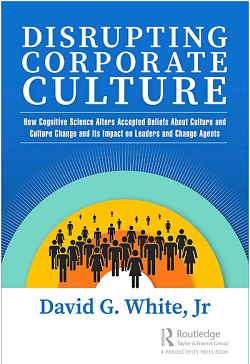
This report based on Disrupting Corporate Culture by David G. White Jr. reveals many problem/solution resources in case study scenarios. The author talks about a better way to accomplish tasks in the corporate setting, using case studies and the basis of corporate culture studies to break down the changes currently taking place.
David G. White Jr., PhD, is a partner and co-founder of Ontos Global. He is a cognitive anthropologist focusing on new approaches to organizational culture and change based on the emerging science of the cultural mind. This brings him into organizational management, sustaining transformation, and the opportunity to work with companies such as ITT, Fidelity Investments, Pratt & Whitney, and CVS. Prior to Ontos, White held positions with Microsoft, Mercer HR Consulting, and Lotus Development (IBM). He’s also a jazz guitarist and composer.
The book discusses how cognitive science alters accepted beliefs about culture, culture change and its impact on leaders and change agents. White discusses cultural awareness. He reviews the shifting process currently happening in corporate culture. White says that by adjusting behavior, shared knowledge becomes data driven fact based evidence. This sort of reference system helps identify cultural purpose and actions.
Based on case studies, White reviews data driven results. As one might expect, the corporate culture standards fade with abstract studies. Newer processes reveal adaptive challenges, which enable managers to make necessary changes. Forward thinking actions based on the new data allow change to take place
AMAZON: www.amazon.com/Disrupting-Corporate-Culture-Cognitive-Accepted/dp/0367280868
Based on the simple concept of “In a world deluged by irrelevant information, clarity is power.” A quote in the beginning of the book by Yuval Noah Harari, the case studies help to simplify understanding.
White uses a number of forms, spreadsheets, and figures to offer a more accurate description of what he observes. These provide greater understanding and reveal the amount of data collected in the process of writing this book. These, along with the results shared in the book bring clarity and understanding to the studies of corporate culture.
The discussions on rules, based on practices and adaptations was particularly helpful, “Thinking in tangible terms is common to manufacturing, such as in the close measurement of manufacturing operations, or in the tendency to address complex organizational issues through the creation of rules and tools rather than through dialog.” (pg 134) White clarifies with examples that were ever more helpful.
White admits we may not like what we see, yet we must have courage to face the logics manifest across organizational norms and accept change. This dynamic of courageous acceptance sounds a lot like tolerance and a burdensome weight of collateral damage as humans are replaced with the more intellectually sophisticated robo-versions of transformed leaders going to the way forward. In reality, change is constant. By making an effort to understand these changes, and apply the data and research to make the best changes possible, White offers new norms that will work in his discussion of the way forward. This book is a worthy read, and I recommend it.
by John Davis, posted by Clay Burton
